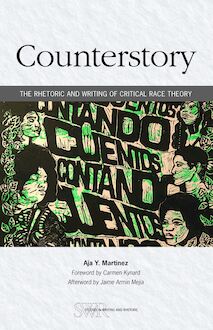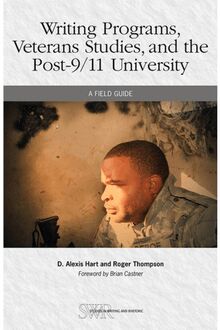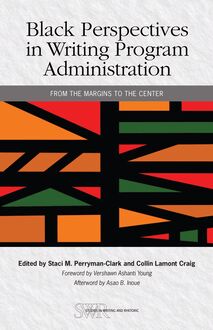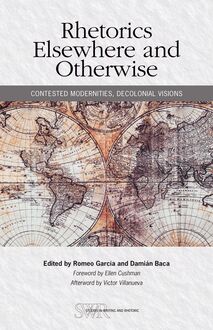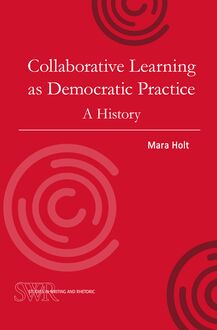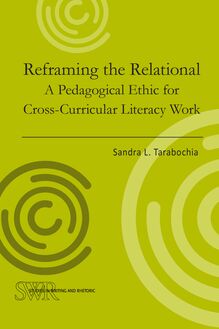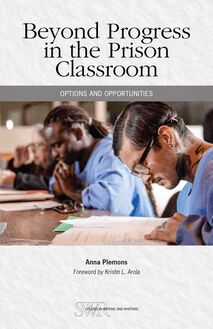-
 Univers
Univers
-
 Ebooks
Ebooks
-
 Livres audio
Livres audio
-
 Presse
Presse
-
 Podcasts
Podcasts
-
 BD
BD
-
 Documents
Documents
-
- Cours
- Révisions
- Ressources pédagogiques
- Sciences de l’éducation
- Manuels scolaires
- Langues
- Travaux de classe
- Annales de BEP
- Etudes supérieures
- Maternelle et primaire
- Fiches de lecture
- Orientation scolaire
- Méthodologie
- Corrigés de devoir
- Annales d’examens et concours
- Annales du bac
- Annales du brevet
- Rapports de stage
La lecture à portée de main
Vous pourrez modifier la taille du texte de cet ouvrage
Découvre YouScribe en t'inscrivant gratuitement
Je m'inscrisReframing the Relational , livre ebook
Découvre YouScribe en t'inscrivant gratuitement
Je m'inscrisEn savoir plus
Vous pourrez modifier la taille du texte de cet ouvrage
En savoir plus

Description
Reframing the Relational examines how writing specialists and faculty in other disciplines communicate with each other in face-to-face conversations about teaching writing.
Sandra L. Tarabochia argues that a pedagogical approach to faculty interactions in Writing Across the Curriculum (WAC) and Writing in the Disciplines (WID) contexts can enhance cross-disciplinary communication and collaboration and ultimately lead to more productive, sustainable initiatives. Theorizing pedagogy as an epistemic, reflexive, relational activity among teacher-learners, she uses a pedagogical framework to analyze conversations between writing specialists and faculty in other disciplines, drawing on transcripts from interviews and recorded conversations.
The author identifies the discursive moves faculty used to navigate three communicative challenges or opportunities: negotiating expertise, orienting to change, and embracing play. Based on this analysis, she constructs a pedagogical ethic for WAC/WID work and shows how it can help faculty embrace the potential of cross-disciplinary communication.
Sujets
Informations
| Publié par | National Council of Teachers of English (NCTE) |
| Date de parution | 07 novembre 2017 |
| Nombre de lectures | 0 |
| EAN13 | 9780814100653 |
| Langue | English |
Informations légales : prix de location à la page 0,1500€. Cette information est donnée uniquement à titre indicatif conformément à la législation en vigueur.
Extrait
CCCC STUDIES IN WRITING & RHETORIC
Edited by Victor Villanueva, Washington State University
The aim of the CCCC Studies in Writing & Rhetoric (SWR) Series is to influence how we think about language in action and especially how writing gets taught at the college level. The methods of studies vary from the critical to historical to linguistic to ethnographic, and their authors draw on work in various fields that inform composition—including rhetoric, communication, education, discourse analysis, psychology, cultural studies, and literature. Their focuses are similarly diverse—ranging from individual writers and teachers, to work on classrooms and communities and curricula, to analyses of the social, political, and material contexts of writing and its teaching.
SWR was one of the first scholarly book series to focus on the teaching of writing. It was established in 1980 by the Conference on College Composition and Communication (CCCC) in order to promote research in the emerging field of writing studies. As our field has grown, the research sponsored by SWR has continued to articulate the commitment of CCCC to supporting the work of writing teachers as reflective practitioners and intellectuals.
We are eager to identify influential work in writing and rhetoric as it emerges. We thus ask authors to send us project proposals that clearly situate their work in the field and show how they aim to redirect our ongoing conversations about writing and its teaching. Proposals should include an overview of the project, a brief annotated table of contents, and a sample chapter. They should not exceed 10,000 words.
To submit a proposal, please register as an author at www.editorialmanager.com/nctebp . Once registered, follow the steps to submit a proposal (be sure to choose SWR Book Proposal from the drop-down list of article submission types).
SWR Editorial Advisory Board
Victor Villanueva, SWR Editor, Washington State University
Anna Plemons, Associate Editor, Washington State University
Frances Condon, University of Waterloo
Ellen Cushman, Northeastern University
Deborah Holdstein, Columbia College Chicago
Asao Inoue, University of Washington Tacoma
Jay Jordan, University of Utah
Min-Zhan Lu, University of Louisville
Paula Mathieu, Boston College
Nedra Reynolds, University of Rhode Island
Jacqueline Rhodes, Michigan State University
Eileen Schell, Syracuse University
Jody Shipka, University of Maryland, Baltimore County
Vershawn Ashanti Young, University of Waterloo
Staff Editor: Bonny Graham Series Editor: Victor Villanueva Interior Design: Mary Rohrer Cover Design: Mary Rohrer and Lynn Weckhorst
NCTE Stock Number: 39783; eStock Number: 39790 ISBN 978-0-8141-3978-3; eISBN 978-0-8141-3979-0
Copyright © 2017 by the Conference on College Composition and Communication of the National Council of Teachers of English.
All rights reserved. No part of this publication may be reproduced or transmitted in any form or by any means, electronic or mechanical, including photocopy, or any information storage and retrieval system, without permission from the copyright holder. Printed in the United States of America.
It is the policy of NCTE in its journals and other publications to provide a forum for the open discussion of ideas concerning the content and the teaching of English and the language arts. Publicity accorded to any particular point of view does not imply endorsement by the Executive Committee, the Board of Directors, or the membership at large, except in announcements of policy, where such endorsement is clearly specified.
NCTE provides equal employment opportunity (EEO) to all staff members and applicants for employment without regard to race, color, religion, sex, national origin, age, physical, mental or perceived handicap/disability, sexual orientation including gender identity or expression, ancestry, genetic information, marital status, military status, unfavorable discharge from military service, pregnancy, citizenship status, personal appearance, matriculation or political affiliation, or any other protected status under applicable federal, state, and local laws.
Every effort has been made to provide current URLs and email addresses, but because of the rapidly changing nature of the Web, some sites and addresses may no longer be accessible.
Library of Congress Cataloging-in-Publication Data
Names: Tarabochia, Sandra, author.
Title: Reframing the relational : a pedagogical ethic for cross-curricular literacy work / Dr. Sandra Tarabochia, University of Oklahoma, Conference on College Composition and Communication.
Description: Urbana, IL : National Council of Teachers of English, 2017 | Series: Studies in writing & rhetoric | Includes bibliographical references and index.
Identifiers: LCCN 2017023504 (print) | LCCN 2017041297 (ebook) | ISBN 9780814139790 | ISBN 9780814139783 (pbk.)
Subjects: LCSH: English language—Composition and exercises—Study and teaching (Higher)—United States. | English language—Rhetoric—Study and teaching (Higher)—United States. | Interdisciplinary approach in education— United States.
Classification: LCC PE1405.U6 (ebook) | LCC PE1405.U6 T33 2017 (print) | DDC 808/.042071173—dc23
LC record available at https://lccn.loc.gov/2017023504
For Craig and for Gabe who sustain me
Contents
Acknowledgments
1. Cross-Curricular Literacy Work as Pedagogical Activity
2. Exploding the Dilemma of Expertise
3. Change as Transformative Learning
4. Possibility of Play: Teaching and Learning in Liminal Spaces
5. A Guiding Ethic for Cross-Curricular Literacy Work
Appendixes : Discursive Moves for Enacting Principles of a Pedagogical Ethic for CCL Work
Notes
References
Index
Author
A cknowledgments
THIS BOOK IS ABOUT TEACHING AND LEARNING. I am profoundly grateful to the many people who have joined me in these mutual activities.
At the heart of this book are the eleven participants who so generously agreed to let me in on their conversations and reflect openly about their experiences as writers, teachers, learners, scholars, and conversation partners. You've taught me so much.
During my time at the University of Nebraska–Lincoln, Amy Goodburn, Shari Stenberg, Margaret Latta, and Chris Gallagher encouraged my curiosity, reflection, and inquiry—and reminded me when it was time to start making sense of things. My gratitude goes also to those who were there from the beginning: Eric Duncan Turley, Alison Friedow, Mike Kelly, Lesley Bartlett, Jessica Rivera-Mueller, and especially Whitney Douglas, who came through with last minute Skype visits, Idaho hikes, and collaborative dinking when it mattered most.
Thanks to Christiane Donahue and the distinguished facilitators of the 2013 Dartmouth Summer Seminar for Composition Research, especially Charles Bazerman, Chris Anson, and Neal Lerner, who patiently guided me to find the research story I had to tell.
And special thanks to members of my Dartmouth cohort, Rachael Cayley, Talinn Phillips, and Megan Titus, who have painstakingly responded to many versions of each chapter and to vague ideas before they became chapters.
Angela, Julie, and Kristy, the amazing women of the Friday morning run/write group, inspire me to reach for ambitious goals on the trail and on the page. Your camaraderie makes all the difference.
I am grateful to my former and current colleagues in the Composition, Rhetoric, and Literacy program at the University of Oklahoma; thanks to Chris Carter, Catherine Hobbs, Susan Kates, Roxanne Mountford, Kathleen Welch, Bill Endres, Will Kurlinkus, and Gabi Rios for their faith, support, and intellectual community.
Thanks, too, to Shannon Madden and Jerry Stinnett. In our long conversations about writing curriculum and pedagogy, you modeled genuine commitment to teaching and learning.
My deepest gratitude to Michele Eodice, who convinced me from the beginning to be bold and brave. Your enthusiasm for the project propelled me through moments of doubt, and your big-picture thinking (still) reminds me that the work is worth doing.
The research at the heart of this book was supported by travel grants and summer fellowships from the University of Oklahoma College of Arts and Sciences.
I am grateful to CCCC Studies in Writing & Rhetoric reviewers, including Rebecca Nowacek, who offered provocative feedback that inspired and challenged me, and to Victor Villanueva whose sustained commitment to the book inspired me to persist. Sincere thanks, as well, to Bonny Graham in the NCTE Books Program and copy editor Josh Rosenberg.
And most of all, thanks to my family—the Doughtys and the Tarabochias. The spring break visits and grandma camps made this book possible. My parents, Linda and Tony, offered sympathetic arms and ears, and loving support for my career in “hooey.” Thanks to my brother, Marty, for your quiet, playful presence. And to my sister, Robin, in solidarity. Our morning conversations helped me keep perspective and take life in stride. And finally, my heartfelt love and gratitude to Craig and Gabe, the source of my energy and spirit and hope, for forcing me to dance in the kitchen. You make me a better researcher, writer, teacher, and person.
1
Cross-Curricular Literacy Work as Pedagogical Activity
TALK ABOUT WRITING AMONG FACULTY FROM DIFFERENT disciplines is the cornerstone of Writing Across the Curriculum (WAC)/Writing in the Disciplines (WID) initiatives (Bazerman et al., 2005; Russell, 2002). While WAC/WID efforts today take many forms— writing-intensive (WI) requirements; peer review of teaching projects; writing fellows programs; co-teaching opportunities; departmental curriculum mapping, assessment, and design; first-year writing seminars—cross-disciplinary interactions among faculty remain central. Indeed, relationships between writing specialists and faculty in other disciplines continue to be recognized as an essential component of cross-curricular literacy (CCL) work (Condon & Rutz, 2
-
 Univers
Univers
-
 Ebooks
Ebooks
-
 Livres audio
Livres audio
-
 Presse
Presse
-
 Podcasts
Podcasts
-
 BD
BD
-
 Documents
Documents
-
Jeunesse
-
Littérature
-
Ressources professionnelles
-
Santé et bien-être
-
Savoirs
-
Education
-
Loisirs et hobbies
-
Art, musique et cinéma
-
Actualité et débat de société
-
Jeunesse
-
Littérature
-
Ressources professionnelles
-
Santé et bien-être
-
Savoirs
-
Education
-
Loisirs et hobbies
-
Art, musique et cinéma
-
Actualité et débat de société
-
Actualités
-
Lifestyle
-
Presse jeunesse
-
Presse professionnelle
-
Pratique
-
Presse sportive
-
Presse internationale
-
Culture & Médias
-
Action et Aventures
-
Science-fiction et Fantasy
-
Société
-
Jeunesse
-
Littérature
-
Ressources professionnelles
-
Santé et bien-être
-
Savoirs
-
Education
-
Loisirs et hobbies
-
Art, musique et cinéma
-
Actualité et débat de société
- Cours
- Révisions
- Ressources pédagogiques
- Sciences de l’éducation
- Manuels scolaires
- Langues
- Travaux de classe
- Annales de BEP
- Etudes supérieures
- Maternelle et primaire
- Fiches de lecture
- Orientation scolaire
- Méthodologie
- Corrigés de devoir
- Annales d’examens et concours
- Annales du bac
- Annales du brevet
- Rapports de stage
